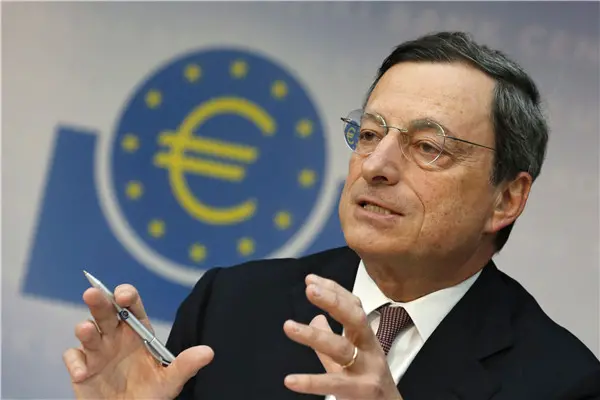Addressing the European Parliament, meeting for its plenary session in Strasbourg, European Central Bank (ECB) President Mario Draghi gave a positive outlook on economic recovery in the Euro area, while presenting the ECB's unconventional monetary support policies as principal factors in the change.
The bank president spoke to the Strasbourg hemicycle in response to a draft resolution on the ECB's annual report for 2015, released last May, in which Members of European Parliament (MEPs) support the institution's measures and provide critique for future decisions.
"The Euro area recovery continues to proceed at a moderate but steady pace. It has shown remarkable resilience to adverse developments and uncertainties emanating from the global environment," President Draghi told MEPs, during a debate on the draft resolution.
He continued to highlight steadily declining unemployment in the euro area due to the fact that "more than 4 million jobs have been created since 2013," when the crisis was at its worst.
The ECB president also noted the positive figures in real GDP growth over 14 consecutive quarters.
"Our monetary policy measures since June 2014 have been a key factor behind these positive developments. Asset purchases, targeted longer term refinancing operations -- TLTROs, as they're called -- and low policy rates have strongly supported the recovery," he continued.
European Central Bank (ECB). Photo: debatingeurope.eu
"The Commission shares the view that the ECB's unconventional monetary policy actions had a positive reaction on overall financing conditions in the euro area," declared Valdis Dombrovskis, Vice-President of the European Commission in charge of the Euro, Social Dialogue, Financial Stability, Financial Services and Capital Markets Union, to the gathered MEPs.
He went on to forecast that implementation of the ECB's measures would continue to improve financial conditions while bringing inflation closer to the target of "below but close to 2 percent in the medium term."
For his part, Draghi celebrated reports from banks of how current measures are contributing to more favorable terms and conditions on loans, leading to lower borrowing costs for firms and households, stimulating both consumption and investment.
The bank president warned, however, that monetary support needed to be continued and met with similar actions in other policy areas.
"The return of inflation towards our objective, still relies on the continuation of the current, unprecedented level of monetary support," he argued, insisting, "Our monetary policy support has to be accompanied by decisive action from other policy areas. In fact, we continue to face a number of structural challenges that are holding back a more dynamic expansion of the Euro area economy."
MEPs, meanwhile, were also critical of an approach that relied on monetary policy alone.
"We have to stimulate overall growth," declared Thomas Mann (Germany) on behalf of the European People's Party Group, saying "We can only use this if we have balanced structural funds and a solid use of budget in all euro zone member states."
"Monetary stimuli have led to some very difficult situations and I don't think you can delay facing up to these difficulties," warned Ernest Urtasun (Spain) on behalf of the European Greens Group.
MEPs went on to urge for greater fiscal responsibility on the level of European Union member states, while leaving the key issues of low and negative interest rates, low inflation and weak demand to be tackled first.
The European Parliament will vote on its draft resolution on Tuesday afternoon.
(APD)
 简体中文
简体中文

